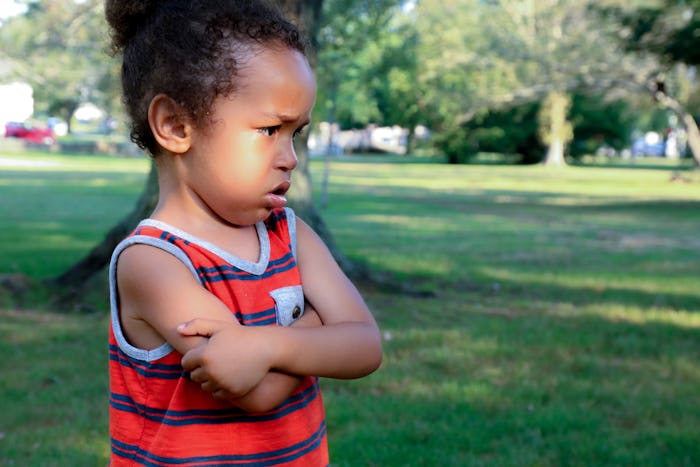Unlike babies who mostly lie around and snuggle, toddlers are mobile, vocal, and are basically miniature people learning how to act appropriately. So when your toddler hauls off an whacks you with their precious little hand, it's going to startle you. So where do toddlers learn to hit?
That's a question with a multi-faceted answer because, let's face it, everyone is different. While different experiences and outside factors are absolutely going to influence what behaviors your toddler picks up on, the instinctual act of hitting is actually part of their development, according to Maureen Healy, author of The Emotionally Healthy Child and parenting coach at Growinghappykids.com.
"Toddlers begin life being very reactive whether it’s hitting, screaming, or crying," Healy tells Romper. "This is an age-appropriate response to feeling big emotions as a toddler. It is not necessarily learned behavior."
It all boils down to self-control. As a toddler, your little one isn't developmentally able to handle their emotions like an adult or even an older child would be able to. So, they express their emotions with their body in the form of hitting because that's literally all their brain knows to do. "Before the age of 4 logic/reason hadn’t come online, which accounts for some challenging behaviors at times," Healy says.
Outside influences can also impact a toddler and lead to hitting, as Dr. Michael Mintz, clinical psychologist at Children's National Hospital explains to Romper. Do they have an older sibling? If so, they may have experienced big bro or sis taking a swipe at a playmate (or at them — it happens!) and simply copied the behavior.
"It is not uncommon for toddlers to hit as a learned behavior. Toddlers might start hitting after observing their siblings, peers, or other people hitting; and there is research showing that toddlers who get hit, such as when parents spank as a form of punishment, are more likely to act aggressively towards others. However, toddlers sometimes hit without having observed it," Dr. Mintz says. "At first, it may be an accidental behavior or a sensory-driven behavior. However, toddlers quickly learn that hitting serves a purpose — most often, that hitting gets a strong reaction out of others. Once toddlers learn that other people react strongly to hitting, they might start hitting as a means to elicit that response."
Luckily, most toddlers will only go through a hitting phase for a short time. In the meantime, there are ways for parents to help quell this unwanted behavior. "Discuss what’s appropriate and inappropriate behavior while doing your best to catch your son or daughter making better choices" Healy says. "He or she is learning to the best of his or her ability to make better choices when emotionally charged, but it takes time and patience from a parent."
Because toddlers are just tiny humans learning how to behave in our big, big world, it may take some persistence to deal with hitting whether it is a learned behavior or a developmental response to their emotions. Dr. Mintz explains that one of the best approaches from a psychological standpoint for dealing with toddler aggression is called "differential attention," which seems like it will also take a massive amount of patience on the parent's part, but will be well worth it in the end.
"If the toddler gets a strong emotional reaction from other people after hitting someone, she or he is likely to keep hitting, particularly at times when they are looking for attention from others. Instead of reacting emotionally, caregivers should try to physically distance themselves from the toddler after she or he hits, avoiding eye contact and avoiding a strong emotional response," Dr. Mintz says. "If the toddler does not get much of a response from a caregiver, the behavior is likely to diminish. The behavior might increase, at first, as the toddler might escalate the behavior (in frequency and/or intensity), but if the caregivers consistently avoid reacting, the behavior should diminish over time."
Experts:
Dr. Michael Mintz, Clinical Psychologist at Children's National Hospital
Maureen Healy, author of The Emotionally Healthy Child and parenting coach at Growinghappykids.com
